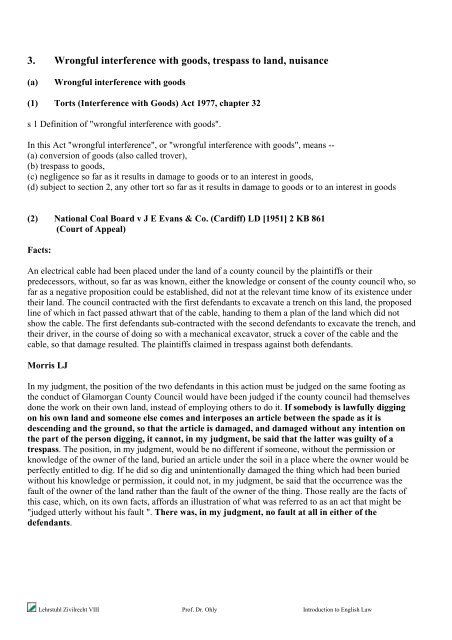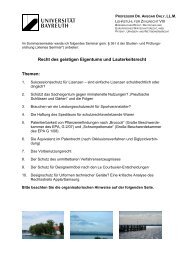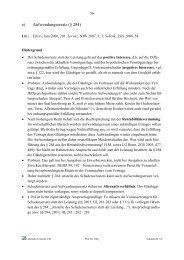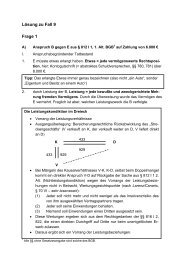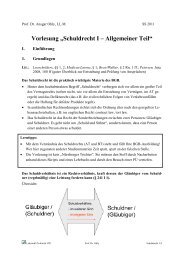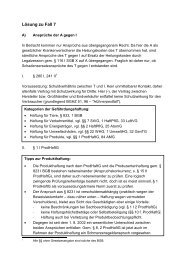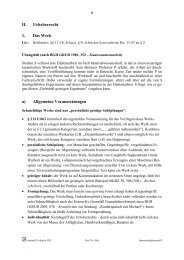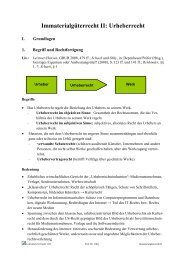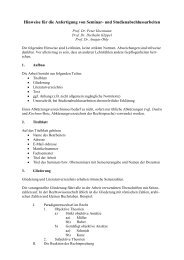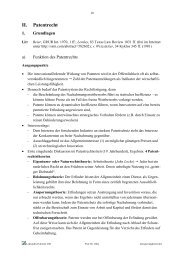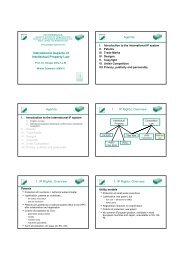3. Wrongful interference with goods, trespass to land, nuisance
3. Wrongful interference with goods, trespass to land, nuisance
3. Wrongful interference with goods, trespass to land, nuisance
You also want an ePaper? Increase the reach of your titles
YUMPU automatically turns print PDFs into web optimized ePapers that Google loves.
<strong>3.</strong> <strong>Wrongful</strong> <strong>interference</strong> <strong>with</strong> <strong>goods</strong>, <strong>trespass</strong> <strong>to</strong> <strong>land</strong>, <strong>nuisance</strong><br />
(a)<br />
<strong>Wrongful</strong> <strong>interference</strong> <strong>with</strong> <strong>goods</strong><br />
(1) Torts (Interference <strong>with</strong> Goods) Act 1977, chapter 32<br />
s 1 Definition of "wrongful <strong>interference</strong> <strong>with</strong> <strong>goods</strong>".<br />
In this Act "wrongful <strong>interference</strong>", or "wrongful <strong>interference</strong> <strong>with</strong> <strong>goods</strong>", means --<br />
(a) conversion of <strong>goods</strong> (also called trover),<br />
(b) <strong>trespass</strong> <strong>to</strong> <strong>goods</strong>,<br />
(c) negligence so far as it results in damage <strong>to</strong> <strong>goods</strong> or <strong>to</strong> an interest in <strong>goods</strong>,<br />
(d) subject <strong>to</strong> section 2, any other <strong>to</strong>rt so far as it results in damage <strong>to</strong> <strong>goods</strong> or <strong>to</strong> an interest in <strong>goods</strong><br />
(2) National Coal Board v J E Evans & Co. (Cardiff) LD [1951] 2 KB 861<br />
(Court of Appeal)<br />
Facts:<br />
An electrical cable had been placed under the <strong>land</strong> of a county council by the plaintiffs or their<br />
predecessors, <strong>with</strong>out, so far as was known, either the knowledge or consent of the county council who, so<br />
far as a negative proposition could be established, did not at the relevant time know of its existence under<br />
their <strong>land</strong>. The council contracted <strong>with</strong> the first defendants <strong>to</strong> excavate a trench on this <strong>land</strong>, the proposed<br />
line of which in fact passed athwart that of the cable, handing <strong>to</strong> them a plan of the <strong>land</strong> which did not<br />
show the cable. The first defendants sub-contracted <strong>with</strong> the second defendants <strong>to</strong> excavate the trench, and<br />
their driver, in the course of doing so <strong>with</strong> a mechanical excava<strong>to</strong>r, struck a cover of the cable and the<br />
cable, so that damage resulted. The plaintiffs claimed in <strong>trespass</strong> against both defendants.<br />
Morris LJ<br />
In my judgment, the position of the two defendants in this action must be judged on the same footing as<br />
the conduct of Glamorgan County Council would have been judged if the county council had themselves<br />
done the work on their own <strong>land</strong>, instead of employing others <strong>to</strong> do it. If somebody is lawfully digging<br />
on his own <strong>land</strong> and someone else comes and interposes an article between the spade as it is<br />
descending and the ground, so that the article is damaged, and damaged <strong>with</strong>out any intention on<br />
the part of the person digging, it cannot, in my judgment, be said that the latter was guilty of a<br />
<strong>trespass</strong>. The position, in my judgment, would be no different if someone, <strong>with</strong>out the permission or<br />
knowledge of the owner of the <strong>land</strong>, buried an article under the soil in a place where the owner would be<br />
perfectly entitled <strong>to</strong> dig. If he did so dig and unintentionally damaged the thing which had been buried<br />
<strong>with</strong>out his knowledge or permission, it could not, in my judgment, be said that the occurrence was the<br />
fault of the owner of the <strong>land</strong> rather than the fault of the owner of the thing. Those really are the facts of<br />
this case, which, on its own facts, affords an illustration of what was referred <strong>to</strong> as an act that might be<br />
"judged utterly <strong>with</strong>out his fault ". There was, in my judgment, no fault at all in either of the<br />
defendants.<br />
Lehrstuhl Zivilrecht VIII Prof. Dr. Ohly Introduction <strong>to</strong> English Law
2<br />
(3) Moorgate Mercantile Co Ltd v Finch and Read [1962] 1 QB 701 (Court of Appeal)<br />
Facts:<br />
The hirer of a car under a hire-purchase agreement lent the car <strong>to</strong> R who, unknown <strong>to</strong> the hirer, intended <strong>to</strong><br />
and did use the car <strong>to</strong> transport uncus<strong>to</strong>med watches. The car was forfeited and sold by the Cus<strong>to</strong>ms and<br />
Excise authorities. The hirer was in arrears <strong>with</strong> a hire-purchase instalment in breach of the hire-purchase<br />
agreement, which provided that the hire-purchase company "in case of any and every breach of any term<br />
or condition hereof the [hire- purchase company] shall forth<strong>with</strong> <strong>with</strong>out notice or demand become<br />
entitled immediately <strong>to</strong> recover possession of the vehicle." The hire-purchase company brought<br />
proceedings against the hirer (who disappeared, was not served, and <strong>to</strong>ok no part in the proceedings) and<br />
R for conversion, and recovered damages against R. On appeal, it being contended that R's use of the car<br />
did not constitute conversion in that it was not inconsistent <strong>with</strong> the hire-purchase company's title, and that<br />
he did not actually intend <strong>to</strong> set up a title in the Cus<strong>to</strong>ms and Excise authorities; and that the hire-purchase<br />
company had no right <strong>to</strong> immediate possession and therefore could not proceed against R.<br />
Danckwerts LJ<br />
The first question <strong>to</strong> decide is whether what the second defendant did constituted a conversion. What he<br />
did, of course, was <strong>to</strong> go <strong>to</strong> the place where the car happened <strong>to</strong> be, <strong>to</strong> borrow it and then fill it up <strong>with</strong> the<br />
uncus<strong>to</strong>med <strong>goods</strong>, which conduct was likely <strong>to</strong> result in the consequence, which indeed in fact happened,<br />
that the car was seized by the Cus<strong>to</strong>ms authorities and sold. I think it is clear, and it seems <strong>to</strong> me <strong>to</strong> be an<br />
irresistible inference, that when he went <strong>to</strong> borrow the car, he had already in his mind the intention of<br />
using it for the illegal purposes for which he did in fact use it, and I think that if he had not deceived the<br />
persons who were concerned <strong>with</strong> the car about his intentions, that is <strong>to</strong> say, the hirer and the garage<br />
owner, they would not have allowed him <strong>to</strong> take it. In any case it seems <strong>to</strong> me that the consequences of<br />
what he did resulted in a conversion of the car in question.<br />
The county court judge cited a passage from Salmond on Torts, 13th ed. (1961), p. 262: "Conversion<br />
Defined: A conversion is an act of wilful <strong>interference</strong>, <strong>with</strong>out lawful justification, <strong>with</strong> any chattel<br />
in a manner inconsistent <strong>with</strong> the right of another, whereby that other is deprived of the use and<br />
possession of it. Two elements are combined in such <strong>interference</strong>: (1) a dealing <strong>with</strong> the chattel in a<br />
manner inconsistent <strong>with</strong> the right of the person entitled <strong>to</strong> it, and (2) an intention in so doing <strong>to</strong><br />
deny that person's right or <strong>to</strong> assert a right which is in fact inconsistent <strong>with</strong> such right."<br />
What the second defendant did in fact was <strong>to</strong> take the car and use it in a way which necessarily resulted, or<br />
might, at any rate, in all probability, result in the owners being deprived of the car for ever, because he had<br />
placed the watches in the car, and that, if it was found out, would inevitably give the Cus<strong>to</strong>ms authorities a<br />
right <strong>to</strong> confiscate the car <strong>with</strong>, of course, a final loss of it <strong>to</strong> the plaintiffs if that event occurred. It seems<br />
<strong>to</strong> me that whether the second defendant intended that consequence <strong>to</strong> follow or not - presumably he did<br />
not intend it, but hoped he would not be found out - nonetheless, he must be taken <strong>to</strong> intend the<br />
consequences which were likely <strong>to</strong> happen from the conduct of which he was guilty, and which did in fact<br />
result in the loss of the car <strong>to</strong> the plaintiffs. To my mind, there is no doubt whatever that there was a<br />
conversion by the second defendant.<br />
(4) Parker v British Airways Board [1982] QB 1004 (Court of Appeal)<br />
Facts:<br />
The defendant airways (B) occupied, as lessees, the international executive lounge at an airport terminal<br />
Lehrstuhl Zivilrecht VIII Prof. Dr. Ohly Introduction <strong>to</strong> English Law
3<br />
and permitted passengers of specific classes <strong>to</strong> use it. B’s employees had instructions governing the action<br />
<strong>to</strong> be taken when they found lost articles or lost articles were handed <strong>to</strong> them. But those instructions were<br />
not published <strong>to</strong> users of the lounge. B did not carry out searches for lost articles. The claimant (C) was in<br />
the lounge as a passenger waiting for his flight when he found a gold bracelet lying on the floor. He<br />
handed it <strong>to</strong> an employee of B and gave the employee his name and address and requested that if the<br />
owner did not claim the bracelet it should be returned <strong>to</strong> him. No one claimed it. B sold it for £ 850 and<br />
retained the proceeds. C sued in conversion. He was awarded £850 as damages.<br />
Donaldson LJ<br />
The plaintiff was not a <strong>trespass</strong>er in the executive lounge and, in taking the bracelet in<strong>to</strong> his care and<br />
control, he was acting <strong>with</strong> obvious honesty. Prima facie, therefore, he had a full finder's rights and<br />
obligations. He in fact discharged those obligations by handing the bracelet <strong>to</strong> an official of the<br />
defendants' although he could equally have done so by handing the bracelet <strong>to</strong> the police or in other ways<br />
such as informing the police of the find and himself caring for the bracelet. The defendants, for their part,<br />
cannot assert any title <strong>to</strong> the bracelet based upon the rights of an occupier over chattels attached <strong>to</strong> a<br />
building. The bracelet was lying loose on the floor.<br />
(b)<br />
Trespass <strong>to</strong> <strong>land</strong><br />
(1) Kelsen v Imperial Tobacco Co. [1957] 2 QB 334 (Queen's Bench Division)<br />
Facts:<br />
An advertising sign erected by the defendants projected in<strong>to</strong> the airspace the plaintiff's single-s<strong>to</strong>rey shop.<br />
In an action for a manda<strong>to</strong>ry injunction <strong>to</strong> remove the sign on the ground of <strong>trespass</strong>, the defendants<br />
alleged, inter alia, that an invasion of superincumbent airspace did not amount <strong>to</strong> a <strong>trespass</strong>, but only <strong>to</strong><br />
<strong>nuisance</strong>, and that, on the facts, no <strong>nuisance</strong> existed.<br />
McNair J<br />
That leads me <strong>to</strong> the next and in some ways most interesting point of the case, namely, whether an<br />
invasion of an airspace by a sign of this nature does give rise <strong>to</strong> an action in <strong>trespass</strong> or whether the rights,<br />
if any, of the owner of the airspace are not limited <strong>to</strong> complaining of <strong>nuisance</strong>; for if his rights are so<br />
limited it is clear on the facts of this case that no <strong>nuisance</strong> was created since the presence of this sign in<br />
the position where it was on this wall caused no inconvenience and no <strong>interference</strong> <strong>with</strong> the plaintiff's use<br />
of his airspace. This question of <strong>trespass</strong> by invasion of the airspace has been the subject of considerable<br />
controversy. (…)<br />
In the case <strong>to</strong> which I have already referred (…) the judge quite clearly <strong>to</strong>ok the view that a sign which<br />
was erected on the wall above the ground floor premises which had been demised <strong>to</strong> the plaintiff and<br />
projected some 4 feet 8 inches from the wall did constitute a <strong>trespass</strong> over the plaintiff's airspace, that<br />
airspace being the column of air above the basement which projected out in<strong>to</strong> the pavement. The report of<br />
Gifford's case reads: "If he" - that is, the judge - "was right in the conclusion <strong>to</strong> which he had come that<br />
the plaintiffs were tenants of the forecourt and were accordingly tenants of the space above the forecourt<br />
usque ad coelum, it seemed <strong>to</strong> him that the projection was clearly a <strong>trespass</strong> upon the property of the<br />
plaintiffs." That decision, I think, has been recognized by the textbook writers, and in particular by the late<br />
Professor Winfield, as stating the true law. It is not <strong>with</strong>out significance that the legislature in the Air<br />
Navigation Act, 1920, section 9 (replaced by section 40 (1) of the Civil Aviation Act, 1949), found it<br />
necessary expressly <strong>to</strong> negative the action of <strong>trespass</strong> or <strong>nuisance</strong> arising from the mere fact of an<br />
Lehrstuhl Zivilrecht VIII Prof. Dr. Ohly Introduction <strong>to</strong> English Law
4<br />
aeroplane passing through the air above the <strong>land</strong>. Accordingly, I reach the conclusion that a <strong>trespass</strong> and<br />
not a mere <strong>nuisance</strong> was created by the invasion of the plaintiff's airspace by this sign.<br />
(2) Konskier v B Goodman Ltd [1928] 1 KB 421 (Court of Appeal)<br />
Facts:<br />
A firm of builders and contrac<strong>to</strong>rs, engaged in pulling down the upper s<strong>to</strong>reys of a house in a certain<br />
street, obtained from the then owner and occupier of the adjoining house, No. 87, a licence <strong>to</strong> pull down<br />
part of the chimney stack of No. 87, in consideration of which they under<strong>to</strong>ok <strong>to</strong> rebuild it and <strong>to</strong> make<br />
good any damage caused <strong>to</strong> No. 87 in doing any of the works. In June, 1926, they finished the work of<br />
pulling down and rebuilding, but they omitted <strong>to</strong> remove a quantity of rubbish which they had allowed <strong>to</strong><br />
fall on the roof of No. 87. In course of time this rubbish, being carried down by a drain pipe from the roof,<br />
choked a gully in the basement of No. 87. In July, 1926, the plaintiff became the tenant of No. 87. In<br />
September, 1926, a heavy s<strong>to</strong>rm of rain flooded the basement of that house owing <strong>to</strong> the gully being<br />
s<strong>to</strong>pped.<br />
Scrut<strong>to</strong>n LJ<br />
Mr. Hilbery (for the defendant) contended that the case must be treated as one of negligence or nothing;<br />
and that there was no continuing negligence, because at the time of the acts or omissions complained of<br />
there was no duty owed by the defendants <strong>to</strong> the plaintiff who did not become tenant until afterwards; that<br />
the duty owed by the defendants was owed <strong>to</strong> the person who was tenant of the house in June, 1926, and<br />
there can be no continuing negligence <strong>with</strong>out a continuing duty. That contention seems <strong>to</strong> be sound, but it<br />
does not dispose of another cause of action, a cause of action arising upon the undisputed facts of the case.<br />
If it was a <strong>trespass</strong> <strong>to</strong> leave the rubbish on the roof, it was a continuing <strong>trespass</strong> at the time when the<br />
plaintiff became tenant of the property. Mr. Hilbery says there was no <strong>trespass</strong>, because at the time when<br />
the rubbish fell upon the roof the defendants had a right <strong>to</strong> put it there provided that the falling of rubbish<br />
upon No. 87 was a reasonable incident of the work they were doing. But they had no more than a limited<br />
licence and were bound <strong>to</strong> remove the rubbish when their work was finished; and if they did not remove<br />
it <strong>with</strong>in a reasonable time after the work was done, they could not and cannot now contend that the<br />
rubbish was lawfully there. By failing <strong>to</strong> remove it they rendered themselves substantially<br />
<strong>trespass</strong>ers and the <strong>trespass</strong> was a continuing <strong>trespass</strong>. But a new occupier entering upon premises<br />
on which there is a continuing <strong>trespass</strong> has a cause of action in <strong>trespass</strong> in respect of it.<br />
(c)<br />
Nuisance<br />
(1) R v Shorrock [1994] 98 Cr App R 67 (Court of Appeal)<br />
Facts:<br />
The appellant was charged <strong>with</strong> causing a public <strong>nuisance</strong> after an "acid party" which had generated 275<br />
complaints <strong>to</strong> the police. The party was held in a field owned by the appellant in his absence. The<br />
appellant had been paid £ 2,000 for the hire of the field; but maintained that he had been unaware of the<br />
use <strong>to</strong> which it had been put. At his trial it was submitted that he had no case <strong>to</strong> answer because the Crown<br />
had failed <strong>to</strong> show that he knew or ought <strong>to</strong> have known that a public <strong>nuisance</strong> would result from his<br />
actions. The appellant was convicted and appealed against conviction on the grounds that the judge had<br />
erred in directing the jury that the correct test <strong>to</strong> be applied was whether the appellant "knew or ought <strong>to</strong><br />
have known of the consequences of his act," and had wrongly rejected a submission of no case <strong>to</strong> answer.<br />
Lehrstuhl Zivilrecht VIII Prof. Dr. Ohly Introduction <strong>to</strong> English Law
5<br />
Rattee J:<br />
Accordingly, in our judgment, the learned trial judge was correct in his direction that the appellant was<br />
guilty of the offence charged if either he knew or he ought <strong>to</strong> have known, in the sense that the means of<br />
knowledge were available <strong>to</strong> him, that there was a real risk that the consequences of the licence granted by<br />
him in respect of his field would be <strong>to</strong> create the sort of <strong>nuisance</strong> that in fact occurred, and that the judge<br />
was accordingly right <strong>to</strong> have rejected the appellant's submission <strong>to</strong> the contrary. A <strong>land</strong>owner was<br />
responsible for a <strong>nuisance</strong> which he knew or ought <strong>to</strong> have known would be the consequence of<br />
activities carried out by him on his <strong>land</strong>. In the case of a private <strong>nuisance</strong>, an aggrieved plaintiff could<br />
enforce the <strong>land</strong>owner's responsibility by an action in <strong>to</strong>rt, while in the case of a public <strong>nuisance</strong> that<br />
responsibility could be enforced either by a rela<strong>to</strong>r action by the At<strong>to</strong>rney-General or by a criminal<br />
indictment. The judge had, accordingly, correctly directed the jury that the appellant would be guilty of<br />
the offence charged if he knew or ought <strong>to</strong> have known that there was a real risk that the consequences of<br />
the licence granted by him in respect of his field would be <strong>to</strong> create the sort of <strong>nuisance</strong> which in fact<br />
occurred.<br />
(2) Christie v Davey [1893] 1 Ch 316 (Chancery Division)<br />
(The facts are outlined in the judgment.)<br />
North J<br />
In my opinion the Plaintiffs are entitled <strong>to</strong> the injunction for which they ask. They have lived for three<br />
years in a semidetached house, and, from the description given <strong>to</strong> me of the way in which sounds are<br />
heard between the houses, I think the party-wall cannot be very substantial. The Plaintiffs' family consists<br />
of the husband, who, perhaps fortunately for himself, is very deaf; the wife, who is admitted <strong>to</strong> be a skilful<br />
musician and an excellent pianist; and a daughter, a young lady who has received a good musical<br />
education and has taken a very good musical degree. She teaches the pianoforte and violin, but she does<br />
not sing. The mother and the daughter have musical pupils, some at home and some abroad. I have no<br />
reason <strong>to</strong> conclude that there has been of late any increase in the number of the pupils or in the extent of<br />
the lessons. Miss Christie practises <strong>to</strong> some extent; Mrs. Christie does not; and the Plaintiffs occasionally<br />
have musical parties in the evening, and they also have music in the evening for their own enjoyment.<br />
The Defendant lives in the adjoining house. He has a wife and a small child. He and his family are said <strong>to</strong><br />
be musical, and for some years past they have been in the habit of having a musical evening once a week.<br />
The music does not seem <strong>to</strong> have been of a very high class, but there is nothing <strong>to</strong> lead me <strong>to</strong> suppose that<br />
it was not good music of its class. On the 30th of September, moved by some cause or other, the<br />
Defendant wrote a letter <strong>to</strong> Mr. Christie. This letter was certainly written in a <strong>to</strong>ne calculated <strong>to</strong> set up the<br />
backs of the Plaintiffs' family. The letter was received by Mr. Christie on the 1st of Oc<strong>to</strong>ber. The next<br />
letter was written by the Plaintiffs' solici<strong>to</strong>r <strong>to</strong> the Defendant on the 12th of Oc<strong>to</strong>ber. During the interval,<br />
according <strong>to</strong> the Plaintiffs' evidence, unusual noises had proceeded from the Defendant's house which<br />
interfered <strong>with</strong> the comfort of the Plaintiffs' family, and <strong>to</strong> some extent <strong>with</strong> the pupils' lessons, and also<br />
<strong>with</strong> Miss Kennedy's composition and practice. This went on <strong>to</strong> such an extent that Mr. Christie instructed<br />
his solici<strong>to</strong>rs.<br />
The result is that I think I am bound <strong>to</strong> interfere for the protection of the Plaintiffs. In my opinion<br />
the noises which were made in the Defendant's house were not of a legitimate kind. They were what,<br />
<strong>to</strong> use the language of Lord Selborne in Gaunt v. Fynney, "ought <strong>to</strong> be regarded as excessive and<br />
unreasonable." I am satisfied that they were made deliberately and maliciously for the purpose of<br />
annoying the Plaintiffs.<br />
Lehrstuhl Zivilrecht VIII Prof. Dr. Ohly Introduction <strong>to</strong> English Law
6<br />
(3) Miller v Jackson [1977] QB 966 (Court of Appeal)<br />
Lord Denning MR<br />
In summertime village cricket is the delight of everyone. Nearly every village has its own cricket field<br />
where the young men play and the old men watch. In the village of Lintz in County Durham they have<br />
their own ground, where they have played these last 70 years. They tend it well. The wicket area is well<br />
rolled and mown. The outfield is kept short. It has a good club house for the players and seats for the<br />
onlookers. The village team play there on Saturdays and Sundays. They belong <strong>to</strong> a league, competing<br />
<strong>with</strong> the neighbouring villages. On other evenings after work they practise while the light lasts. Yet now<br />
after these 70 years a judge of the High Court has ordered that they must not play there any more. He has<br />
issued an injunction <strong>to</strong> s<strong>to</strong>p them. He has done it at the instance of a newcomer who is no lover of cricket.<br />
This newcomer has built, or has had built for him, a house on the edge of the cricket ground which four<br />
years ago was a field where cattle grazed. The animals did not mind the cricket. But now this adjoining<br />
field has been turned in<strong>to</strong> a housing estate. The newcomer bought one of the houses on the edge of the<br />
cricket ground. No doubt the open space was a selling point. Now he complains that when a batsman hits a<br />
six the ball has been known <strong>to</strong> <strong>land</strong> in his garden or on or near his house. His wife has got so upset about it<br />
that they always go out at week-ends. They do not go in<strong>to</strong> the garden when cricket is being played. They<br />
say that this is in<strong>to</strong>lerable. So they asked the judge <strong>to</strong> s<strong>to</strong>p the cricket being played. and the judge, much<br />
against his will, has felt that he must order the cricket <strong>to</strong> be s<strong>to</strong>pped: <strong>with</strong> the consequence, I suppose, that<br />
the Lintz Cricket Club will disappear. The cricket ground will be turned <strong>to</strong> some other use. I expect for<br />
more houses or a fac<strong>to</strong>ry. The young men will turn <strong>to</strong> other things instead of cricket. The whole village<br />
will be much the poorer. and all this because of a newcomer who has just bought a house there next <strong>to</strong> the<br />
cricket ground.<br />
It has been often said in <strong>nuisance</strong> cases that the rule is sic utere tuo ut alienum non laedas. But that is a<br />
most misleading maxim. Lord Wright put it in its proper place in Sedleigh-Denfleld v. O'Callaghan [1940]<br />
A.C. 880,903: "[It] is not only lacking in definiteness but is also inaccurate. An occupier may make in<br />
many ways a use of his <strong>land</strong> which causes damage <strong>to</strong> the neighbouring <strong>land</strong>owners and yet be free from<br />
liability ... a useful test is perhaps what is reasonable according <strong>to</strong> the ordinary usages of mankind<br />
living in society, or more correctly in a particular society." I would, therefore, adopt this test. Is the<br />
use by the cricket club of this ground for playing cricket a reasonable use of it To my mind it is a<br />
most reasonable use.<br />
This case is new. It should be approached on principles applicable <strong>to</strong> modern conditions. There is a contest<br />
here between the interest of the public at large; and the interest of a private individual. The public interest<br />
lies in protecting the environment by preserving our playing fields in the face of mounting development,<br />
and by enabling our youth <strong>to</strong> enjoy all the benefits of outdoor games, such as cricket and football. The<br />
private interest lies in securing the privacy of his home and garden <strong>with</strong>out intrusion or <strong>interference</strong> by<br />
anyone. (…) As between their conflicting interests, I am of opinion that the public interest should prevail<br />
over the private interest. The cricket club should not be driven out.<br />
Geoffrey Lane LJ<br />
Was there here a use by the defendants of their <strong>land</strong> involving an unreasonable <strong>interference</strong> <strong>with</strong> the<br />
plaintiffs' enjoyment of their <strong>land</strong> There is here in effect no dispute that there has been and is likely <strong>to</strong> be<br />
in the future an <strong>interference</strong> <strong>with</strong> the plaintiffs' enjoyment of no. 20 Brackenridge. The only question is<br />
whether it is unreasonable. It is a truism <strong>to</strong> say that this is a matter of degree. What that means is this. A<br />
balance has <strong>to</strong> be maintained between on the one hand the rights of the individual <strong>to</strong> enjoy his house and<br />
garden <strong>with</strong>out the threat of damage and on the other hand the rights of the public in general or a<br />
neighbour <strong>to</strong> engage in lawful pastimes. Difficult questions may sometimes arise when the defendants'<br />
activities are offensive <strong>to</strong> the senses, for example, by way of noise. Where, as here, the damage or<br />
Lehrstuhl Zivilrecht VIII Prof. Dr. Ohly Introduction <strong>to</strong> English Law
7<br />
potential damage is physical the answer is more simple. There is, subject <strong>to</strong> what appears hereafter, no<br />
excuse I can see which exonerates the defendants from liability in <strong>nuisance</strong> for what they have done or<br />
from what they threaten <strong>to</strong> do. It is true that no one has yet been physically injured. That is probably due<br />
<strong>to</strong> a great extent <strong>to</strong> the fact that the householders in Brackenridge desert their gardens while cricket is in<br />
progress. The danger of injury is obvious and is not slight enough <strong>to</strong> be disregarded. There is here a<br />
real risk of serious injury.<br />
There is, however, one obviously strong point in the defendants' favour. They or their predecessors have<br />
been playing cricket on this ground (and no doubt hitting sixes out of it) for 70 years or so. Can someone,<br />
by building a house on the edge of the field in circumstances where it must have been obvious that balls<br />
might be hit over the fence, effectively s<strong>to</strong>p cricket being played It does not seem just that a longestablished<br />
activity - in itself innocuous - should be brought <strong>to</strong> an end because someone chooses <strong>to</strong><br />
build a house nearby and so turn an innocent pastime in<strong>to</strong> an actionable <strong>nuisance</strong>. Unfortunately,<br />
however, the question is not open. In Sturges v. Bridgman, 11 Ch.D. 852 this very problem arose. The<br />
defendant had carried on a confectionery shop <strong>with</strong> a noisy pestle and mortar for more than 20 years.<br />
Although it was noisy, it was far enough away from neighbouring premises not <strong>to</strong> cause trouble <strong>to</strong> anyone,<br />
until the plaintiff who was a physician built a consulting room on his own <strong>land</strong> but immediately adjoining<br />
the confectionery shop. The noise and vibrations seriously interfered <strong>with</strong> the consulting room and became<br />
a <strong>nuisance</strong> <strong>to</strong> the physician. The defendant contended that he had acquired the right either at common law<br />
or under the Prescription Act 1832 by uninterrupted use for more than 20 years <strong>to</strong> impose the<br />
inconvenience. It was held by the Court of Appeal (…) that it is no answer <strong>to</strong> a claim in <strong>nuisance</strong> for the<br />
defendant <strong>to</strong> show that the plaintiff brought the trouble on his own head by building or coming <strong>to</strong> live in a<br />
house so close <strong>to</strong> the defendant's premises that he would inevitably be affected by the defendant's<br />
activities, where no one had been affected previously: see also Bliss v. Hall (1838) 4 Bing. N.C. 18<strong>3.</strong> It<br />
may be that this rule works injustice, it may be that one would decide the matter differently in the absence<br />
of authority. But we are bound by the decision in Sturges v. Bridgman, 11 Ch.D. 852 and it is not for this<br />
court as I see it <strong>to</strong> alter a rule which s<strong>to</strong>od for so long.<br />
Lehrstuhl Zivilrecht VIII Prof. Dr. Ohly Introduction <strong>to</strong> English Law


